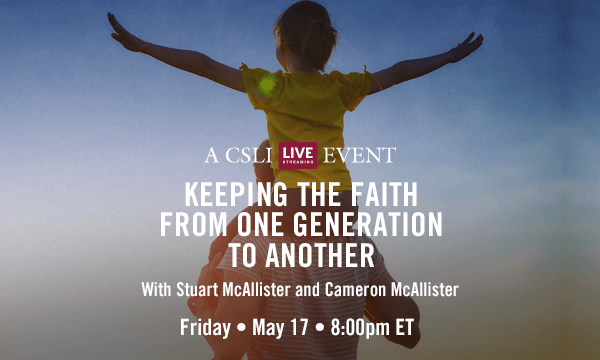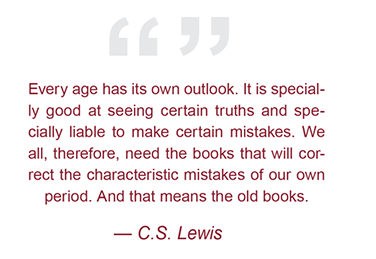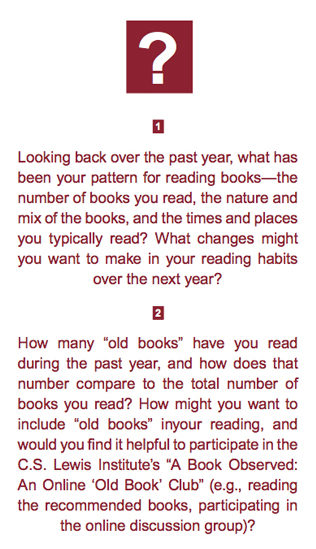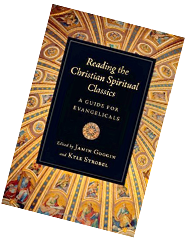Back to series
A Book Observed: An Online ‘Old Book’ Club

Recommended Reading:

Download or Listen to Audio
A Book Observed: An Online ‘Old Book’ Club
(An Interactive Feature from Knowing & Doing)
Click here to open a Print - Friendly PDF
It is with great delight and much anticipation that we at The C.S. Lewis Institute are launching a new, regular interactive feature from Knowing & Doing to help readers benefit from reading the great “old books.” We are calling this feature “A Book Observed: An Online ‘Old Book’ Club”.
 C.S. Lewis famously prescribed, “It is a good rule, after reading a new book, never to allow yourself another new one till you have read an old one in between. If that is too much for you, you should at least read one old one to every three new ones.”1 In each issue of Knowing & Doing, we plan to include an article featuring one great old book that we know will provide valuable reading for those who want to deepen their faith and connect to a long tradition of thoughtful devotion. This article will introduce the book and offer suggestions for how to best approach it. In addition, we are providing an interactive online experience so that readers have an opportunity to engage in a discussion about the book with others, enabling them to benefit even further from their reading of these great books.
C.S. Lewis famously prescribed, “It is a good rule, after reading a new book, never to allow yourself another new one till you have read an old one in between. If that is too much for you, you should at least read one old one to every three new ones.”1 In each issue of Knowing & Doing, we plan to include an article featuring one great old book that we know will provide valuable reading for those who want to deepen their faith and connect to a long tradition of thoughtful devotion. This article will introduce the book and offer suggestions for how to best approach it. In addition, we are providing an interactive online experience so that readers have an opportunity to engage in a discussion about the book with others, enabling them to benefit even further from their reading of these great books.
As a young man, Lewis observed in a letter to a friend, “When one has read a book, I think there is nothing so nice as discussing it with some one else …”2 Years later, Lewis, J.R.R. Tolkien, and others would gather regularly at The Eagle and Child Pub in Oxford for discussions of great ideas, books they were currently writing, and many other stimulating topics that weren’t often discussed in other settings. One can only imagine the stimulating discussions that developed and the wide variety of great books that were quoted or endorsed. We hope that by encouraging the reading of great “old books”, and facilitating a community experience of lively online discussion of those books with others, our new book club will help stimulate spiritual growth and powerful discipleship of heart and mind.
I’ve offered the first installment for this new feature elsewhere in this issue. It is my hearty endorsement for Jonathan Edwards’s The Religious Affections.
For the rest of this article, I will offer some thoughts on the question: Why read the great old books?
My family and I sat glued to our TV on September 6, 1995, as we watched Cal Ripkin circle Oriole Park at Camden Yards. As he trotted, he high-fived fans who stood to cheer as he broke Lou Gehrig’s record of 2,130 consecutive games played. As the camera panned the cheering crowd, it zoomed in on a sign that read, “We consider ourselves the luckiest fans on the face of the earth.” I responded by saying, “Ooooh! That’s good!”
My sons looked at me like I was from Mars. What’s so good about a boring sign like that? Eventually (after the 22-minute standing ovation settled down) I told my sons about Lou Gehrig’s immortal speech at Yankee Stadium when he said farewell to the crowd and the sport he loved. He had been diagnosed with ALS, the disease that now carries his name, and had to quit playing. Tearfully he told the crowd that even though he’d been given a bad break, “I consider myself the luckiest man on the face of the earth.”
I appreciated the new 1995 sign, because I knew the old 1939 speech. The old informed the new. It did more than inform. It gave context. It filled out. It uplifted. It brought depth. C.S. Lewis noted that one reason to read old books is to help us appreciate new ones. In fact, it helps us understand discussions that have been transpiring for a very long time; as a result, we grasp deeper truths. Here’s how Lewis put it:
If you join at eleven o’clock a conversation which began at eight you will often not see the real bearing of what is said. Remarks which seem to you very ordinary will produce laughter or irritation and you will not see why — the reason, of course being that the earlier stages of the conversation have given them a special point.3
In addition to appreciating new books or recent discussions on a deeper level, Lewis offered several other reasons for reading old books. He felt that firsthand knowledge was better than secondhand knowledge. I don’t think he said this as a mere personal preference. We gain a depth of understanding hearing it from the first person (or one of the first) who promoted the idea. Thus, his prescription, quoted at the beginning of this article, “It is a good rule, after reading a new book, never to allow yourself another new one till you have read an old one in between. If that is too much for you, you should at least read one old one to every three new ones.”
 I must confess my ratio is nowhere near that. But I wish it more closely aligned with Lewis’s suggestion. When I have read old books (Augustine’s Confessions comes to mind), I have sensed a grasp on seminal ideas that I could see influencing many, many people in the history of the church. And I have seen how God used those ideas in forming my faith — even before I knew they came from Augustine or someone of his stature.
I must confess my ratio is nowhere near that. But I wish it more closely aligned with Lewis’s suggestion. When I have read old books (Augustine’s Confessions comes to mind), I have sensed a grasp on seminal ideas that I could see influencing many, many people in the history of the church. And I have seen how God used those ideas in forming my faith — even before I knew they came from Augustine or someone of his stature.
Lewis also proposed that old ones tend to be better than new ones! Or at least they are deeper. For a very long time, the majority of Christian books were doctrinal in nature. They elucidated the biblical text. They sought to understand biblical teaching. They dug into what God would have us realize about his character or the way of faith or how to live a godly life. It is a relatively recent phenomenon for books to be more devotional than doctrinal. Rather than helping us understand, they seek to help us apply. That’s certainly important, but a great deal of depth has been sacrificed along the way. Quite a few observers have wondered how the modern church got to be “a mile wide and an inch deep.” Perhaps the pattern of ignoring of old books is part of that problem.
Lewis shared an ironic observation about his reading.
“For my own part, I tend to find the doctrinal books often more helpful in devotion than the devotional books, and I rather suspect that the same experience may await many others.”5
This matches some of my experience. Some today want to pit doctrine against devotion, but I find the former feeds the latter rather than diminishing it.
 There’s another unexpected (to me, at least) consequence of reading old books. We see how unified the church has been in the past when it comes to core beliefs. Of course, there are far too many differences in minor issues of modes of practice. But, to quote Lewis again, “if any man is tempted to think—as one might be tempted who read only contemporaries—that ‘Christianity’ is a word of so many meanings that it means nothing at all, he can learn beyond all doubt, by stepping out of his own century, that this is not so.” No wonder he liked to speak so often about “mere Christianity.” He found, by reading old books, that the vast majority of God’s people have agreed on the vast majority of God’s truths. How refreshing.
There’s another unexpected (to me, at least) consequence of reading old books. We see how unified the church has been in the past when it comes to core beliefs. Of course, there are far too many differences in minor issues of modes of practice. But, to quote Lewis again, “if any man is tempted to think—as one might be tempted who read only contemporaries—that ‘Christianity’ is a word of so many meanings that it means nothing at all, he can learn beyond all doubt, by stepping out of his own century, that this is not so.” No wonder he liked to speak so often about “mere Christianity.” He found, by reading old books, that the vast majority of God’s people have agreed on the vast majority of God’s truths. How refreshing.
 I would add another reason to broaden our bookshelves with older volumes before clicking to buy the newest, hot-off-the-press item. It can prevent us from repeating mistakes of the past. Many of the old books were written to help people avoid error. Augustine’s City of God was written so Christians would not align their hopes too closely with current political power structures. (That might have some relevance today). Martin Luther’s commentary on Galatians tried to clarify the differences between the gospel and works-based righteousness. Jonathan Edwards’s Religious Affections was presented to help people distinguish between genuine conversion and numerous counterfeits.
I would add another reason to broaden our bookshelves with older volumes before clicking to buy the newest, hot-off-the-press item. It can prevent us from repeating mistakes of the past. Many of the old books were written to help people avoid error. Augustine’s City of God was written so Christians would not align their hopes too closely with current political power structures. (That might have some relevance today). Martin Luther’s commentary on Galatians tried to clarify the differences between the gospel and works-based righteousness. Jonathan Edwards’s Religious Affections was presented to help people distinguish between genuine conversion and numerous counterfeits.
We could even say that some not-quite-so-old books could help us avoid current temptations toward error. A reading of J. Gresham Machen’s Christianity and Liberalism (from 1923) could have prevented many from falling for the heresy that Rob Bell proposed in his best-selling Love Wins. A student of church history and a reader of Machen would have known that Bell was saying nothing new. His universalism had been proposed in the first century and in the early twentieth century (and probably every century in between). The only difference is that Bell said it in hip, cool ways while wearing cutting-edge eyewear. But readers of old books wouldn’t have bought his new one.
May God use A Book Observed: An Online ‘Old Book’ Club and the reading of “old books” to help more and more of His people articulate, defend, share and live the Christian faith with depth and joy – just like so many who have gone before us.
|
Notes: |

Randy Newman
Senior Fellow for Apologetics and Evangelism, CSLI
Randy Newman is the Senior Fellow for Apologetics and Evangelism at the C.S. Lewis Institute. He has taught at several evangelical seminaries. After serving for over 30 years with Campus Crusade for Christ, he established Connection Points, a ministry to help Christians engage people’s hearts the way Jesus did. He has written seven books, Questioning Evangelism, Corner Conversations, Bringing the Gospel Home, Engaging with Jewish People, Unlikely Converts: Improbable Stories of Faith and What They Teach Us About Evangelism, Mere Evangelism. and his most recent, Questioning Faith: Indirect Journeys of Belief through Terrains of Doubt. Randy has also written numerous articles about evangelism and other ways our lives intertwine with God’s creation. He earned his MDiv and PhD in Intercultural Studies from Trinity International University.

Recommended Reading:
Reading the Christian Spiritual Classics: A Guide for Evangelicals, edited by Jamin Goggin and Kyle Strobel (IVP Academic, 2013)
Ever since Richard Foster wrote Celebration of Discipline in 1978, evangelicals have hungered for a deeper and more historic spirituality. Many have come to discover the wealth of spiritual insight available in the Desert Fathers, the medieval mystics, German Pietism and other traditions. While these classics have been a source of life-changing renewal for many, still others are wary of these texts and the foreign theological traditions from which they come.
The essays in this volume provide a guide for evangelicals to read the Christian spiritual classics. The contributions fall into four sections. The first three answer the big questions: why should we read the spiritual classics, what are these classics and how should we read them? The last section brings these questions together into a brief reading guide for each of the major traditions. Each essay not only explores the historical and theological context, but also expounds the appropriate hermeneutical framework and the significance for the church today.
Together these essays provide a comprehensive and charitable introduction to the spiritual classics, suitable for both those who already embrace them and those who remain concerned and cautious. Whether you are a newcomer to historic spirituality or a seasoned reader looking to go deeper, you will find this volume to be a reliable resource for years to come.
 COPYRIGHT: This publication is published by C.S. Lewis Institute; 8001 Braddock Road, Suite 301; Springfield, VA 22151. Portions of the publication may be reproduced for noncommercial, local church or ministry use without prior permission. Electronic copies of the PDF files may be duplicated and transmitted via e-mail for personal and church use. Articles may not be modified without prior written permission of the Institute. For questions, contact the Institute: 703.914.5602 or email us.
COPYRIGHT: This publication is published by C.S. Lewis Institute; 8001 Braddock Road, Suite 301; Springfield, VA 22151. Portions of the publication may be reproduced for noncommercial, local church or ministry use without prior permission. Electronic copies of the PDF files may be duplicated and transmitted via e-mail for personal and church use. Articles may not be modified without prior written permission of the Institute. For questions, contact the Institute: 703.914.5602 or email us.
-
Recent Podcasts
A Welcome Change in Apologetics
by Randy Newman, Aimee Riegert on April 19, 2024We’re burdened for our friends who don’t know...Read More
-
Questions That Matter Podcast – Samuel James and Digital Liturgies
by Samuel James, Randy Newman on April 19, 2024
-
The Side B Stories – Dr. James Tour’s story
by Jana Harmon, James Tour on April 12, 2024
-
Recent Publications
Isn’t Morality Relative?
by Christopher L. Reese on April 1, 2024It is widely accepted in the Western world...Read More
-
Do Muslims and Christians Worship the Same God?
by Andy Bannister on March 1, 2024
-
Artificial Intelligence and Its Impacts on Humanity
by John Lennox on February 13, 2024
0
All Booked
0.00
All Booked
0.00
All Booked
22140
GLOBAL EVENT: Keeping the Faith From One Generation To Another with Stuart McAllister and Cameron McAllister, 8:00PM ET
https://www.cslewisinstitute.org/?event=global-event-keeping-the-faith-from-one-generation-to-another-with-stuart-mcallister-and-cameron-mcallister-800pm-et&event_date=2024-05-17®=1
https://www.paypal.com/cgi-bin/webscr
2024-05-17

Next coming event
Days
Hours
Minutes
Seconds
GLOBAL EVENT: Keeping the Faith From One Generation To Another with Stuart McAllister and Cameron McAllister, 8:00PM ET
On May 17, 2024 at 8:00 pmSpeakers

Randy Newman
Senior Fellow for Apologetics and Evangelism, CSLI
Team Members

Randy Newman
Senior Fellow for Apologetics and Evangelism, CSLI
Randy Newman is the Senior Fellow for Apologetics and Evangelism at the C.S. Lewis Institute. He has taught at several evangelical seminaries. After serving for over 30 years with Campus Crusade for Christ, he established Connection Points, a ministry to help Christians engage people’s hearts the way Jesus did. He has written seven books, Questioning Evangelism, Corner Conversations, Bringing the Gospel Home, Engaging with Jewish People, Unlikely Converts: Improbable Stories of Faith and What They Teach Us About Evangelism, Mere Evangelism. and his most recent, Questioning Faith: Indirect Journeys of Belief through Terrains of Doubt. Randy has also written numerous articles about evangelism and other ways our lives intertwine with God’s creation. He earned his MDiv and PhD in Intercultural Studies from Trinity International University.






